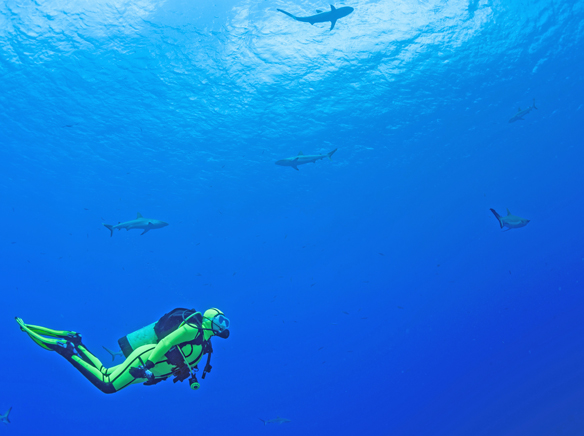Ever since I saw the movie Jaws as a kid, sharks have haunted me in some ways. But that didn’t’ stop me from going swimming and body boarding in the surf as a teen. It’s always in the back of my mind if I go in the water. Though my trips into the ocean these days are minimal.
Still, with this week’s news of the young man getting bitten by a shark while on a kayak force us to again point out that, while scary and intimidating, according to experts, sharks have little interest or regard for us as humans. They spend their days hunting for food, but for the most part, humans simply aren’t on their menu.
The Catalina Island Swim Club is out there every day, doing their morning swims. If sharks were looking for humans to eat, they’d be there every morning, like the breakfast buffet at Caesar’s Palace. Longtime Swim Club member, Charlie Canby said the swimmers stay fairly close to shore, where any aggressive sharks are not likely to be. However, he said they see them often.
“At times we do see sharks, horn sharks, nurse sharks, leopard sharks and those we make up names for,” Canby said. “Sharks are beautiful swimmers, so graceful and with looks that are so different from any fish, a marvel to see on a day of good fortune.”
Canby also shared a story about a shark they spotted with a hook in its dorsal fin and wrapped in fishing line. They thought it was dead, but when they approached it, it moved. As they tried to free it, a harbor boat came over and they borrowed some wire cutters and were able to free the shark.
Experts believe that most shark attacks on humans happen when the shark mistakes the human for a seal or other food source it is looking for. Statistics say that the chances of dying by a shark attack are miniscule. A 2003 data sheet by the National Safety Council calculated the chances of dying by shark attack were 1 in 3,748,067. It wasn’t listed on their 2019 online data sheet, but odds for dying in a bicycle accident, or in a firework accident are considerably more likely.
If you are interested in more info on sharks, Assemblyman Patrick O’Donnell has scheduled a virtual Town Hall, with Dr. Chris Lowe, of the Cal State University, Long Beach Shark Lab. Marine Safety Chief Gonzalo Medina of the Long Beach Fire Department will also be part of the presentation. The Town Hall was scheduled prior to the attack this week. The full link to register for the event is https://a70.asmdc.org/event/20210707-learn-about-shark-safety-and-behavior-during-virtual-town-hall or you can log into the thecatalinaislander.com and a link will be included with this article.
There is plenty of information online about ways to minimize the risk of being attacked by a shark, such as not wearing shiny jewelry that might be mistaken for fish scales. Most of us have probably seen videos of divers and swimmers, moving about in the water among schools of sharks, being paid little attention by the animals. I wouldn’t recommend doing that, but otherwise, swimming in the ocean is a safe activity. Remember, the movie Jaws was fiction.
Although, if you think about it, the movie took place around their Fourth of July holiday season and today’s date is … Oh My God! GET OUT OF THE WATER!!
Happy Fourth of July everyone.
Ted Apodaca is the editor of the Catalina Islander. He can be reached at editor@thecatalinaislander.com, or at 562-317-1100.










